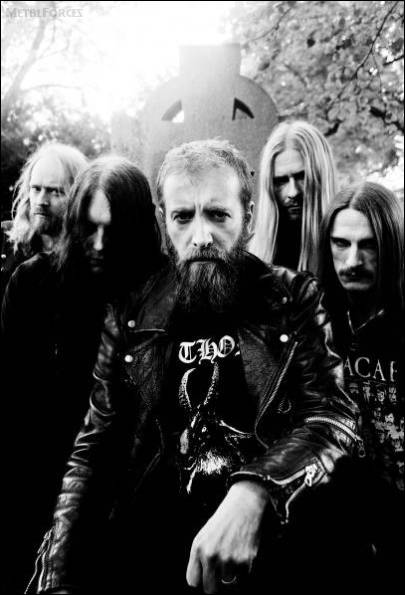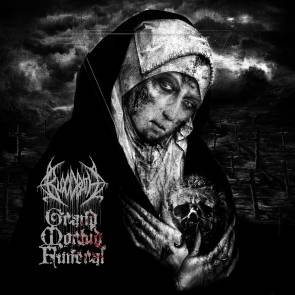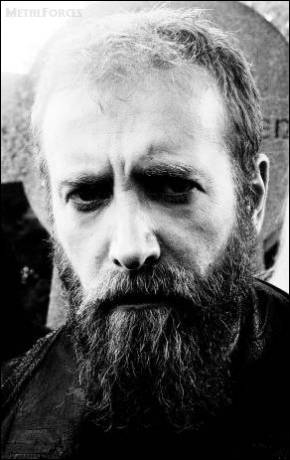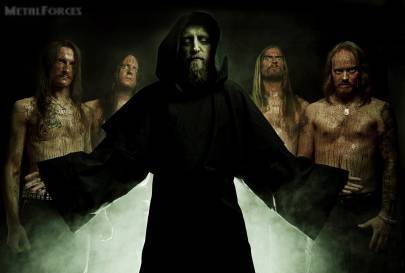
BLOODBATH – Unite In Pleasure
Anthony Morgan
November 2014

|
On September 16th, 2014, it was revealed that death metal supergroup Bloodbath had recruited Nick Holmes – vocalist for West Yorkshire-based gothic metal outfit Paradise Lost – to step behind the microphone. The departure of previous vocalist Mikael Åkerfeldt – of Stockholm, Sweden-based ensemble Opeth – had been confirmed during April 2012.
“We were touring with Katatonia in America in 2011, and they asked me if I wanted to do it,” Nick remembers. “I was a little bit apprehensive – I actually thought that they were joking at the time. I had quite a few years to think about it. Eventually, about a year ago, a friend of mine said ‘Well, why don’t you do it? I can’t believe you’re kind of messing around.’ I said ‘Actually, you’re right, yeah.’ I thought ‘What the hell. Why not?’ So yeah, it wasn’t like I auditioned or anything. We’re all friends, so it was already a good start, the fact that we were good friends. We come from similar backgrounds musically, even though I’m a few years older than those guys.
“The thing is, with death metal, it’s not exactly familiar territory. I was kind of passionate about it for a good eight years, from my teenage years into my twenties. For me, it’s just very, very nostalgic, but it’s good nostalgia. It’s one of the best parts of my life, really. In the late 80s and early 90s, it was a magical time. Death metal was starting, and it’s kind of bringing all that back again. It’s a pleasant thing; there’s certainly nothing negative about it. So yeah, all of the boxes kind of ticked.”
Bloodbath’s members explained the level of commitment required from the frontman. “It’s the same with those guys, with Katatonia though,” he notes. “If Bloodbath was the only band that they had, then I guess it wouldn’t work. They have the same commitments that we have with Paradise Lost, so yeah. We just kind of do it when it’s time to do it, in-between our main bands – which are Katatonia and Paradise Lost. Axe (Martin Axenrot, drums), he’s got Opeth as well, and Opeth are super busy all the time. Yeah, it is very much a project. Everyone concerned takes it as that.”
Nick hasn’t followed material issued by the death metal scene in more recent years. “Not at all,” he admits. “Me, I was very much the first wave of death metal. It was always the bands who did demos; a lot of the bands that I liked, they didn’t even make it to album. I was into demos. Bands like Death and Morbid Angel, they were all in their infancy, and it was kind of before labels such as Peaceville and Earache picked up on it and released albums. It was kind of before that, and the old Florida bands.
“I was very much in the tape trading scene. It was like a little club of guys around each city and each area around the world that were into this. Possessed’s Seven Churches (October 1985) was like the ultimate death metal album on vinyl, but yeah, I’m certainly aware of what’s around now. What are we talking, though? Like tenth generation? There’s some great death metal about for sure, but my heart will always be nearer the first wave, absolutely. It’s like when Metallica started; I was into them when they kind of first started, so again, I always like the old Metallica stuff.”
Many latter day death groups attempt to recreate the sound of the original wave of death metal. “Definitely, but every generation takes the last generation as an influence,” the singer reasons. “When you throw stuff like nu-metal into the mix, to a lot of young guys that’s their idea of what extreme metal is, but that kind of skipped me because I’m too old. There’s a lot of different influences coming from different areas now though, whereas when we were kids, it was pretty much Venom, Slayer, and Metallica, and that was pretty much it really. The black metal thing for example, everything’s based upon Bathory which again – to me – is the ultimate black metal band. Nothing could be better than that. There’s a lot of bands copying that thing, but just not to the same sort of authenticity for me.
“You’re into what you grow up with; the Behemoth album (The Satanist, February 2014) is a fantastic album for example, but I can’t get as excited about it as I would Blood Fire Death by Bathory (October 1988), purely because it’s of that time. As a 43-year-old man, I can’t get as excited as I would do when I was 18 (laughs). It’s impossible (laughs). You can only get so excited at my age (laughs). Everything is repeating itself. There’s nothing wrong with that, because everything goes in circles anyway. It comes around again, and people just have a different jacket after ten years.”
Tracks for November 2014 Bloodbath outing Grand Morbid Funeral were authored for the most part by the time Nick joined the band’s ranks. “I worked on two songs with Anders (Nyström, guitars) – ‘Beyond Cremation’, and ‘Unite In Pain’ – which we wrote in the last couple of weeks before we fully recorded it,” he divulges. “I wasn’t actually aware that I was going to get to work on anything on the album. I thought that it was all written, but those two songs kind of needed sorting.

|
“With ‘Beyond Cremation’, we were trying to think of how far you could go beyond where something was actually finished beyond death. We figured that when you were cremated, that’s pretty much as far as you can take it. Then we thought ‘What’s beyond cremation?’ It was mainly the title that we liked (laughs). Then ‘Unite In Pain’ is about as opposed to wanting to die a peaceful death, wanting to have the most violent death possible. That’s of course is ridiculous, but again, it’s just taking it to extremes. I just tried to out-gore everybody else, really. You can play fast and looser death metal, especially with horror-type lyrics. When you’re dealing with fiction, you can go anywhere with it. My lyrics in Paradise Lost are very grounded and very much about real life, but in Bloodbath it’s not about that. It’s like an audio version of a horror film – you can kind of go anywhere with it.
“At kind of the 11th hour I hopped in with those two, but yeah, they’re very different to what I’m used to working on – different to what I do with Paradise Lost. Again, it was quite interesting to work on those two. As for the rest of the songs, they were written. Sodo (Per ‘Sodomizer’ Eriksson, guitars), Anders, and Jonas (Renkse, bass), they write their own songs. They don’t collaborate with each other; they write their own songs. With that said, the songs are pretty different, I think. Within the album, there’s a lot of different styles there. Sodo is 30-years-old, so his idea of death metal is different to mine. He’s very much into Deicide and bands like that, which is a band that I was never really into, so there’s a different angle there. For me to sing those kinds of songs is quite a challenge, because I’m not used to that kind of stuff. It’s not the death metal that I grew up listening to, so it’s kind of interesting really.”
Grand Morbid Funeral marks a return to Bloodbath’s earlier death metal sound, the lyricist submits. “I’d just say purely as a bystander – because obviously I wasn’t involved in them – I think the last couple of albums kind of got very much into the technology side of things, which they wanted to refrain from this time,” he observes. “They wanted to go back to a more kind of raw, very old Swedish death metal sound. I think that was what the intention was, whereas – like I say – there was very much a kind of Florida sound at one point. I think that’s kind of been shelved, and they’ve gone back to the old basic, kind of early 90s Swedish sound, which I think they might’ve achieved.”
Prior to joining, Nick was “very familiar with Nightmares Made Flesh (September 2004, Bloodbath’s second outing),” he recalls. “That’s the one that I first heard, and I thought that that was a really good death metal album. When I listened more and more though, I started liking the early stuff more. I prefer Resurrection Through Carnage (November 2002), in hindsight. It ticked more boxes with me after a while, so yeah. That’s probably my favourite album now, which like I say, takes in more where I’m from musically, but Nightmares Made Flesh was a very good album I think.”
Resurrection Through Carnage features the voice of Mikael Åkerfeldt, while Nightmares Made Flesh is the only Bloodbath platter to feature the voice of Peter Tägtgren – vocalist of Swedish death metal assortment Hypocrisy and industrial metal project PAIN. “I couldn’t even tell the difference initially, but now I can – I can now,” the vocalist shares. “I’ve heard Mike singing death metal in Opeth, because we’ve played with Opeth a lot. I prefer Mike’s voice in hindsight, yeah. ‘So You Die’ is a great song; I think his voice is fantastic on that song.”
Cutting parts for Grand Morbid Funeral, Nick requested demo tracks, instructing the respective Bloodbath songwriters to lay down guide vocals. “They just kind of squeeked into a microphone – or did whatever they needed to do – to let me know where they wanted me to sing the lyrics etcetera,” he explains. “So yeah, I knew exactly what I was doing with 90% of the stuff. I like to be prepared; I don’t wanna go in there, and not know what’s happening. I was pretty prepared for it all, really. There was some stuff that you might have to do in two halves, but once you’ve sang on an album, you can kind of learn how to sing them properly then anyway. I always find that I don’t know an album until I’ve sang it, because then you’re just copying what you’ve done on the album. So yeah, there was some stuff that would be pretty easy to do in halves as opposed to one take, but generally speaking, there was nothing that was difficult I would say.
“I went over to Stockholm for a week, and spent a week there tracking the vocals at the Katatonia studio where they record things (The City Of Glass). I guess the guitars and everything else were done around that time, but I wasn’t there. The drums were done in February or something – they were done a long time ago, the drums. Katatonia were touring. I didn’t really have anything to do with recording other than I went over there, I sang, and then I came back home, and that’s it. Everything had already been recorded. The mix and everything else was sorted out elsewhere, when I had already left.”

|
Singing predominantly death metal vocals wasn’t an issue for the Bloodbath frontman. “It was fine,” he reckons. “I knew exactly what was expected. There was no way that I was gonna go into this, and try and change things. I know exactly what the band is about, and I knew exactly what was expected for the album. It had to be extreme, it had to be death metal – nothing but death metal. So yeah, I knew exactly what I was doing.”
Death metal traits within Paradise Lost and Bloodbath are vocally comparable, but not entirely similar. “When Paradise Lost played death metal, we were always very slow, so the slower songs on the album you can probably identify with my voice,” Nick critiques. “With the fast stuff you won’t, because I never sang fast in Paradise Lost. I like fast songs, though – I like fast songs as much as slow songs. Paradise Lost always comes from a very kind of doom background. I love that, but I’ve always been a fan of fast songs. I love fast songs. Slayer has been one of my favourite bands all my life, so yeah, I love the fast stuff.
“Again, with new Paradise Lost material, there’s elements of death metal there, and it sounds like old Paradise Lost. It doesn’t sound like Bloodbath – the Bloodbath stuff is all about extremities. Even though we are under the umbrella of heavy metal, I think musically it’s far, far removed. If you’re a fan of old death metal or prefer doom death, there are still elements there that might be of interest, but everything’s about extremities with Bloodbath I think.”
Although passionate with respect to Paradise Lost, changing things up so to speak must’ve been pleasant for the singer. “Well, that’s it,” he replies. “Like I said, if it was a project that was similar in vein to Paradise Lost, I wouldn’t have seen the point in that. If it was like a gothic metal project, I just wouldn’t have seen the point because I’ve got that base covered. I don’t need to do another of that kind of thing (laughs). So yeah, it’s working within heavy music, but it’s a different kind of heavy music. So yeah, it’s been pretty refreshing to do it.
“I’m good friends with the guys as well, which is very important. You can’t underestimate how important it is to like the people you’re working with – that’s really helped it as well, I think. If I hadn’t known the guys and they had asked me to do it, I don’t know if I would’ve even gone for it, to be honest. Like I said, it’s gotta be fun. If you know people and you can have a laugh with them, and have common ground there, you will have fun. If it’s just about trying to be super-serious or trying to reinvent the wheel, though? It isn’t about that. So yeah, so far it’s been a bit of a laugh.”
A music video was created for the track ‘Church Of Vastitas’. “There’s not a great deal to say about it, really,” Nick muses. “We just had to do a video, and that song was chosen. I originally felt we would do a video for ‘Unite In Pain’, but they chose that one. Again though, it was just about making the most miserable video we could do really (laughs). They just went to a graveyard. Where else are you gonna go? I don’t even know where they filmed it, because we actually changed what it was being filmed about. I just sang in the Old Nick costume, which I don’t think will be coming out again now.
“My parts, I just did in the Paradise Lost rehearsal room, in our studio. Then the video guy, he filmed the other bits. I don’t even know where the graveyard was – I couldn’t tell you. I wasn’t there when that happened, but he did a good job of doing it. It was only two locations, but yeah, I just did it in the Paradise Lost studio (The Chapel Studios, Lincolnshire) – in the cellar. It’s a big old building. Videos, they’re pretty much a promotional item. They’re not like they used to be in the 80s, when it was like a mini-film. That kind of thing doesn’t happen any more.”
Record labels simply lack the capital to fund such music videos nowadays. “Well, they do,” the wordsmith seconds. “That’s the thing. It’s just another promotional tool. They have their uses for sure, but like I say, I remember the days when people used to spend a lot of money on videos. Paradise Lost has spent a lot of money on videos. Now, with so many ways to see things, it isn’t necessary to spend. You can’t really have an exclusive on a music channel, because you can guarantee it’s probably leaked somewhere else beforehand. Like you say, you’re not gonna see many ‘November Rain’s these days (Guns N’ Roses, from September 1991’s Use Your Illusion I).”
Several live festival appearances have been earmarked for 2015. “There’s quite a lot of stuff coming up,” Nick tells. “I think there’s about ten shows booked in. There’s ones that I didn’t even know we were doing, so I guess I just agreed to everything. We’re under the same management as Paradise Lost and Katatonia, so they just kind of slot everything in-between commitments with those bands as well. Yeah though, it would be nice to do one festival in one country maybe. Nobody’s really into the idea of doing a tour. Never say never, but for now it’s just nice to do some big festivals. We’ll see what happens.”

|
Paradise Lost is in the midst of recording its 14th studio effort, meanwhile. “Three of the guys are in the studio now, in London,” the vocalist informs. “I’m going down on Thursday (November 20th). With every single album you do, you try to make your best album. Also, it’s our 14th album. There’s definitely a difference in… You can say going back to your roots, but I don’t like saying that. There’s no way we’re gonna sound like we did in 1991, because we don’t play like that any more – people are better at playing and stuff. There’s certain elements on the new album that are very, very much like the late 80s though, which I think will surprise a few people. Then there’s other elements, which are very much in keeping with the last few years as well, so there’s a fair bit of variation on it for sure. I think it’s more varied than the last album, but after 14 albums, you’ve just gotta hear it and make your own minds up. It doesn’t matter what I say, because everyone always says ‘Well, you said that last time’.”
‘Death metal-tinged’ is how Paradise Lost’s forthcoming opus is being touted. “There’s the fact that I’m gonna be singing like that,” Nick cites. “I’m guessing that Greg (Mackintosh, lead guitars) will come up with a riff that’s very reminiscent of perhaps the old days, and so you’ve gotta sing in a certain style over that riff just to give it justice. If you sing kind of half-arsed over a big riff like that, it just sounds kind of crap. I want to make the most out of the music and do singing that suits the music that’s underneath it, so I have kind of held back in that respect. I’ve just said ‘Well look, fuck it. If anything sounds like death metal, let’s make it death metal.’ We’ve very much gone with our heart on that, but the songs are very catchy. Some of it’s very death metal though, but it’s Paradise Lost death metal.”
Grand Morbid Funeral was released on November 17th, 2014 in Europe and subsequently one day later in North America, all via Peaceville Records.
Interview published in November 2014.
Related Posts via Categories
- SCOTTISH SICKNESS – A Report On The Scottish Death Metal Scene, Featuring BRAINBATH, PUTRID FATE And RANCID CADAVER (October 2022) | Features / Interviews @ Metal Forces
- BLOODBATH – Survival Of The Sickest (2022) | Album / EP Reviews @ Metal Forces Magazine
- LARVAE – Join The Hardcore Cult! (June 2022) | Features / Interviews @ Metal Forces Magazine
- TRENCH FOOT – Sacrificing Morals For Gory Obscenities (June 2022) | Features / Interviews @ Metal Forces Magazine
- L.A. GUNS – Trigger Happy (March 2019) | Features / Interviews @ Metal Forces Magazine
- CANCER – Crimes So Evil (November 2018) | Features / Interviews @ Metal Forces Magazine
- U.D.O. – The Tank Drives On (August 2018) | Features / Interviews @ Metal Forces Magazine
- SIEGE OF POWER – Bleeding For The Cause (August 2018) | Features / Interviews @ Metal Forces Magazine
- MOONSPELL – A Taste Of Live Eternity (August 2018) | Features / Interviews @ Metal Forces Magazine
- MONSTROSITY – Dark Matter Invocation (August 2018) | Features / Interviews @ Metal Forces Magazine
|
|





